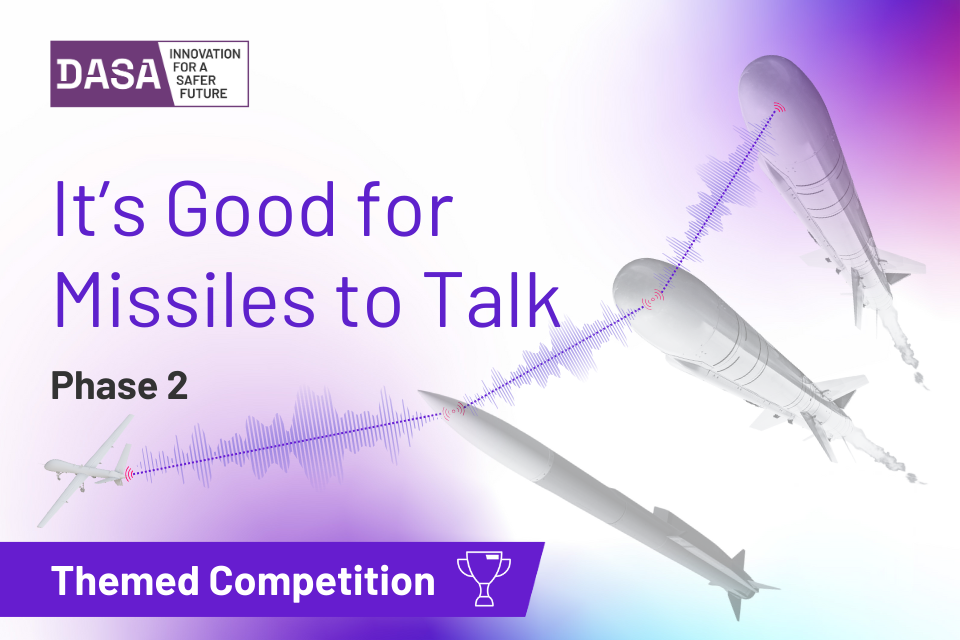Competition: It’s Good for Missiles to Talk (Phase 2)
We are seeking proposals that identify and develop novel technologies that could be exploited in the development of cooperative missiles.
Documents
Details

This Defence and Security Accelerator (DASA) competition is run on behalf of the Ministry of Defence (MOD) supported by UK missile strategic partners. The aim is to identify and develop novel technologies that could be exploited in the development of a new category of missile – cooperative missiles.
Cooperative missiles can communicate with each other, share situational awareness and organise themselves to ‘work together’ efficiently, during an engagement and within operator-set constraints, to achieve a common objective. The aim of the work is to:
-
develop technologies to deliver cooperative missiles.
-
demonstrate how the capability could be integrated into future systems.
The implementation of cooperative missiles will offer UK armed forces’ enhanced capability, providing a significant advantage in comparison to current capability. There are many benefits that can be realised. For example, considering collateral damage during missions or live safety data updates if non-combatants enter the battlefield post-launch. Cooperative missiles can share this vital information to ensure an abort function is carried out live during a mission, under human operator authority.
It is important to note that the operation of UK missile systems will always remain under human control and we are only interested in technologies that could enable cooperation between missiles within this context.
Phase 2 of this DASA competition builds on Phase 1 with more focused challenge areas. Proposals from innovators that seek to expand on their Phase 1 work are welcome, as well as innovators that are new the competition. Successful submissions into phase 2 will identify and increase the maturity of novel technologies to enable exploitation in future cooperative missile programs.
We encourage proposals where the innovation should output over a range of Technology Readiness Level (TRL) 3-5.
Successful proposals will present credible plans for progressing new, advanced technologies which could underpin a future cooperative missile.
Submission deadline
Midday on 20 February 2024 GMT
Where do I submit my proposal?
Via the DASA Online Submission Service for which you will require an account. Only proposals submitted through the DASA Online Submission Service will be accepted.
Total funding available
The total funding available for It’s Good for Missiles to Talk – Phase 2 is £1.6 million (ex VAT). This is expected to fund multiple proposals between £100,000 to £300,000 (ex VAT) over a maximum project duration of 12 months.
We encourage proposals at Technology Readiness Level (TRL) 3-5. Proposals should consider these key aspects:
-
high-level design description and design justification of concept/technology established.
-
initial interface specification with other missile subsystems established.
-
ensure the output will go beyond theoretical principles of the solution and shall demonstrate key components (possibly not in their final form factor) within a lab or battlefield environment relevant to a missile application.
-
technology performance and dependencies based lined against extant solution.
Innovators do not need to have successfully bid into Phase 1 to bid into this phase of the competition.
Further funding may be made available for a third phase to develop higher TRL technologies outside of this DASA competition.
Updates to this page
-
Updated the Public facing information and Things you should know about DASA contracts: DASA terms and conditions sections to include the sharing of the Proposal Value Proposition Statement as well as the title and abstract.
-
Supplier 1-2-1 Question and answers from the first session on the 19 December have been uploaded.
-
The PowerPoint slides are now available to view from the Q&A session as well as the anonymised questions and answers asked during the session.
-
First published.